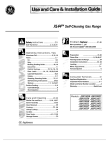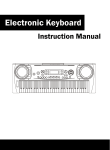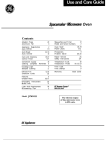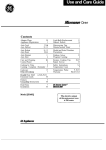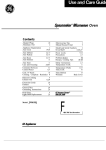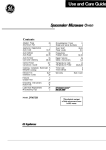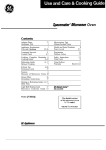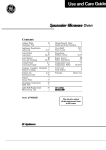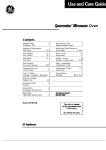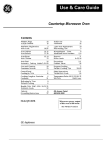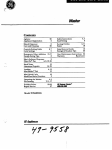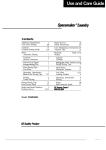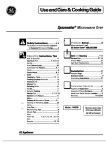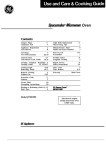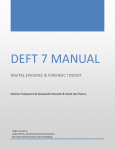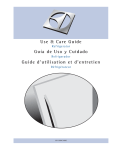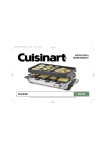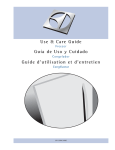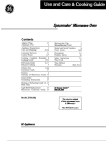Download GE JE1465K User's Manual
Transcript
CouMertipMicrwwe Oven
Contents
Adapter Plugs
Appliance Registration
32
2
Installation
Light Bulb Replacement
32
33
Auto Cook
Auto Defrost
19,20
14, 15
Microwaving Tips
Minute/Second Timer
Auto Reheat
Auto Roast
16, 17
12, 13
Model and Serial Numbers 2,5
11
Popcorn
13
9
Auto Simmer
Auto Start
Automatic Cooking Guide
Care and Cleaning
Control Panel
Cook ‘N Watch
5, 19
33
6,7
10
Precautions
Problem Solver
Program Cooking
Recipes, Cooking Tips
Repair Service
Safety Instructions
3
8
2-4
34
7
22-29
35
2-4
Cooking by Time
10, 11
Cooking Complete Reminder 5
Temperature Cook
9
Temperature Probe 4,5,9, 12,33
Cookware
Defrosting bv Time
Warranty
Delayed Cooking
Double Duty Shelf
21
18
Back Cover
8
4,5,30,31,33
Extension Cords
Features
32
5
Grounding Instructions
Hold Time
32
8
GEAmer Centerm
80~6262000
Model JE1465K
E
GEAppiances
Help us help you...
Before usi~ your oven,
read this book carefully.
Be sure your microwave
oven is r~istered.
It is intended to help you operate
and maintain your new microwave
oven properly.
Keep it handy for answers to your
It is important that we know the
location of your microwave oven
should a need occur for adjustments.
Your supplier is responsible for
registering you as the owner.
Please check with your supplier to
be sure he has done so; also send in
your Consumer Product Ownership
Registration Card. If you move, or
if you are not the original purchaser,
please write to us, stating model
and serial numbers. This appliance
questions.
If you don’t understand something
or need more help, write (include
your phone number):
Consumer Affairs
GE Appliances
Appliance Park
Louisville, KY40225
Write down the model
and serial numbers.
You’ll find them on a label inside
the oven.
These numbers are also on the
Consumer Product Ownership
Registration Card that came with
your microwave oven. Before
sending in this card, please write
these numbers here:
must be -red. M- be certain
that it is.
Write to:
GE Appliances
Range Product Service
Appliance Park
Louisville, KY40225
If you received a
&mWed oven...
Immediately contact the dealer (or
builder) that sold you the oven.
Model Number
Serial Number
Use these numbers in any
correspondence or service calls
concerning your microwave oven.
Save time and money.
Before you request service...
check the Problem Solver on page 34.
It lists causes of minor operating
problems that you can comt yourself.
Optional Accessories
PmCAmONS
~ AVOID
POSS~LE
HPOSW m
HCESSIVE
m~OWA~
ENERGY
(a) W Not Attempt to operate this
oven with the door open since
opendoor operation can result in
harmful exposure to microwave
energy. It is important not to
defeat or tamper with the safety
interlocks.
~) W Not Race any object
between the oven front face and
the door or ~ow soil or cleaner
residue to accumulate on sealing
surfaces.
(c) W Not O~rate the oven
if it is damaged. It is particularly
important that the oven door close
properly and that there is no
damage to the:
(1) door &nt)
(2) hinges and latches (broken or
loosened)
(3) door seals and sealing surfaces.
(d) The Oven Shotid Not be
adjusted or repaired by anyone
except properly qualified service
personnel.
Optional accessories are available
at extra cost from your GE supplier.
~17 Installation Kit converts this
oven to a built-in wall oven. Note:
JX17 kits should not be installed
above a built-in oven
with rotisserie feature.
All these things are normal with your microwave oven:
● Steam or vapor escaping from
around the door.
● Light reflection around door or
outer case.
● Dimming oven light and change
in blower sound may occur while
operating at power levels other
than high.
● Dull thumping sound while
oven is operating.
● Some TV-Radio interference
might be noticed while using your
microwave oven. It’s similar to the
interference caused by other small
appliances and does not indicate a
problem with your oven.
2
.—.
H~~T
S-TY ~S~UCTIONS
Read dl instructions before using tMs appliance.
Microvvavi~ fips
● Make sure dl cookware used in
your microwave oven is suitible for
microwaving. Most glass casseroles,
cooking dishes, measuring cups,
custard cups, pottery or china
dinnerware which does not have
metilic trim or gl= with a metiic
sheen can be used. Some cookware
is labeled “suitable for microwavtig~’
If you are unsure, use this dish test:
Measure 1 cup water in a glass cup.
Place in oven on or beside dish.
Microwave 1 minute at High. If
water becomes hot, dish is microwave
safe. If dish heats, it should not be
used for microwaving.
. Paper towels, wax paper, and
plastic wrap can be used to cover
dishes in order to retain moisture
and prevent spattering.
● Some microwaved foods require
stirring, rotiting, or rearranging.
Check your cookbook.
● Steam builds up pressure in foods
which are tightly covered by a skin
or membrane. Pierce potatoes, egg
yolks and chicken livers to prevent
bursting.
men using electrical appliances
basic safety precautions should be
followed, including the following:
the risk of burns, electric shmk,
* MwtOWmmorap~
to messive microwave energy:
. Use this app~ance ody for iti
intended use as described in
this manual.
● mad and fo~ow the s~ific
‘6P~U~ONS ~ AVO~
POSS~LE EXPOSURE ~
EXC~SIVE MCROWA~
ENERGY” on page 2.
Q This appliance must be
grounded. Connect ody to
properly groundd outiet. See
“GROUNDWGNSTRU~ONS”
on page 32.
For best operation, plug ~h
appliance into ~ts own eldrid
outlet, to prevent flickering of
●
lights, blowing of fise or tripping
of circuit breaker.
. tiw or l~te this appliance
only in accordance tith the
provided installation
instructions.
● &certain to place the front
surface of the door three Mm or
more back from the countertop
edge to avoid accidenti tipping
of the apptiance in no- usage.
●
w
not Cover or blwk any
opetings on the apptiance.
Do not immew power cord
or plug in water.
● *p power cord away from
heated surfaces.
● DO not let ~wer cord h~g
over edge of table or counter.
●
3
. DO not o~rate tMs apptiance
ifit has a damaged power cord
or plug, if it is not working
properly, or if it has been
damaged or dropped.
● SW door su~ce cl~afing
instructions on page 33.
. TM appliance shodd be
serviced only by qu~fied
service personnel. Contact
nearest authorized service kcility
@r examination, repair or
adjustment.
. AS with any appliance$ close
supervision is nesary when
used by children.
● To reduce the risk of fi~ in
the oven cavity:
-Do not ovemookfd. CmMy
attend appliance if paper, plastic,
or other combustible materials are
placed inside the oven to facditate
cooking.
–Remove wire twist-tics from
paper or plastic bags before
placing bag in oven.
-Do not use your microwave
oven to dry newspapers.
–Do not usc reqcled paper
produb. Recycled paper towels,
napkins and wax paper can
contain meti flecks which may
cause arcing or ignite. Paper
products containing nylon or
nylon flaments shotid be
avoided, as they dso may ignite.
–Do not operate the oven while
empty to avoid damage to the
oven and the danger of fire. H
by accident the oven should run
empty a minute or two, no harm
is done. However, try to avoid
operating the oven empty at all
times-it saves energy and
prolongs the life of the oven.
IMPOmmT SAFETY INSTRUCTIONS
–Do not pop popcorn in your
microwave oven u~ess in a special
microwave popcorn accessory or
udess you use prepackaged
popcorn labeled for use in
microwave ovens.
–Do not overcook potatoes.
They could dehydrate and catch
fire, causing damage to your oven.
. Ifmateria~ ~side oven
should ignite, keep oven door
closed, turn oven off, and
disconnect power cord, or shut
off power at fuse or circuit
breaker panel.
● Some produc~ such as whole
eggs and sealed containers-for
example, closed glass jars-may
explode and should not be heated
in this oven,
. Avoid heating baby food in
glass jars, even without their lids;
especially meat and egg mixtures.
● Don’t defrost frozen beverages
in narrow necked bodes (especitiy
carbonated beverages), Even if the
container is opened, pressure
can build up. This can cause the
container to burst, resulting in
injury.
● Use meti ody as directed in
this manual and cookbook
provided.
TV dinners in foil trays less than
3/4” high may be microwaved–
just remove top foil cover and
return tray to box. When using
meti in the microwave oven,
keep meti (other than metal
shelfl at least 1 inch away from
sides of oven.
. c~kwa~ may become hot
because of heat transferred from
the heated fwd. Potholders may
be needed to handle the
cookware.
● Sometimes, the glass cooking
tray can become too hot to
touch. Be carefil when touching
the tray during and after cooking.
. Foo& cooked in liquids (such
as pasm) may tend to boil over
more rapidy than fd containing
less moisture. Should this occur,
refer to page 33 tir instructions on
how to clean the inside of the oven,
● Thermometer-Do
not
use a thermometer in food you
are microwaving unless the
thermometer is designed or
recommended for use in the
microwave oven.
c Remove the temperature probe
from the oven when not in use. H
you Imve the probe inside the oven
without inserting it in fti or liquid,
and turn on microwave energy, it
can create electrical arcing in the
oven and damage oven walls.
s Plastic cookware—Plastic
cookware designed for microwve
cooking is very usetil, but should
be used carefilly. Even rnicrowvesafe plastic may not be as tolerant
of overcooking conditions as are
glass or ceramic materials and
may soften or char if subjected to
short periods of overcooking. In
longer exposures to overcooking,
the fmd and cookware could
ignite. For these reasons: 1) Use
microwave-safe plastics ody and
use them in strict compliance
with the cookware manufacturer’s
recommendations. 2) Do not
subject empty cookware to
microwaving. 3) Do not permit
children to use plastic cookware
without complete supervision,
s When cooking pork follow
the directions exactly and always
cook the meat to an internal
temperature of at least 170°F.
This assures that, in the remote
possibility that it maybe present
in the meat, trichina will be wed
and meat will be safe to eat.
● Boiling eggs is not
recommended in a microwave
oven. Pressure can build up
inside the egg yolk and may cause
it to burst, resulting in injury.
4
(continued)
●
F~&
with unbroken outer
‘%kin” such as potatoes, sausages,
tomatoes, apples, chicken livers
and other giblets, and egg yolks
(see previous caution) should be
pierced to allow steam to escape
during cooking.
● f+Boilable” cooking pouches
and tightly closed plastic bags
should be slit, pierced or vented
as directed in cookbook. If they
are not, plastic could burst during
or immediately atir cooking,
possibly resulting in injury, Also,
plastic storage containers should be
at least partidy uncoveti because
they form a tight seal. When
cooking with containers tightly
covered with plastic wrap, remove
wvering care~y and direct steam
away from hands and face.
● Spontaneous boiting-Under
certain special circumstances,
liquids may start to boil during
or shortly after removal from the
microwave oven. To prevent burns
from splashing liquid, stir the
liquid briefly before removing the
container from the microwave oven.
●
use of the DOUBLE D~~
shelf accessory.
—Remove the shelf from oven
when not in use.
–Do not store or cook with shelf
on floor of oven. Product damage
may result.
–Use pot holders when handling
the shelf and cookware. They may
be hot.
–Do not use microwave browning
dish on shelf. The shelf could
overheat,
–Be sure that the shelf is
positioned properly inside the
oven to prevent product damage.
Use of shelf with Auto Cook,
Auto Reheat or Popcorn feature is
not recommended (see page 30).
SAVE THESE
INSTRUCTIONS
—
Features of Your Oven
Cooting Complete Reminder
(For all cooking features except Auto Roast code4)
To remind you that you have food in the oven, the
oven will beep once a minute until you either open
the oven door or touch the CLEAR/OFF pad.
1. Door Handle. Pull to open door.
Door must be securely latched for
oven to operate.
2. Door Latches.
3. Viewing Window with Metal
Shield. Metal screen permits
viewing of foods and keeps
microwaves confined inside oven.
4. Oven Vent.
5. Model and Serial Numbers.
6. MICROTHERMOMETER’M
Temperature Probe. Use with
Temp Cook/Hold and Auto Roast
functions only.
m1465K
1.4 Cubic Foot
Oven Interior
7. Mode Stirrer Cover. Protects
the microwave energy distributing
system. Do not remove this cover.
You will damage the oven.
8. Receptacle for Temperature
Probe. Temperature probe must be
securely inserted into receptacle
when using Temp Cook/Hold or
Auto Roast.
9. Oven Interior Light. Turns on
when the door is opened or when
the oven is operating.
10. Touch Control Panel and
Display. See pages 6 and 7 for
instructions.
When You Plug in the Oven
The display panel lights up. After 15 seconds, all lights disappear
and “RESET” appears. Touch the CLEAR/OFF pad and oven is
ready for use and the clock can be set.
If power is disrupted at any time, the above sequence recurs, and
you must reset clock after touching CLEAR/OFF.
5
11. Glass Cooking Tray. Tray
must be in place when using the
oven. Cooking performance will be
unsatisfactory without the tray in
place. The tray may be removed for
cleaning.
D. Automatic Cooking Guide.
Quick reference codes for many
frequently prepared foods.
~. DOUBLE-DUTYTM Shelf.
Lets you microwave several foods
at once. (See Safety Instructions
and pages 30 and 31 for special
instructions. ) When this shelf is not
in use, please remove from the oven.
Your Touch Control Rnel
The Touch Control Panel allows
you to set the oven controls
el~tronically with the touch
of a finger. It’s designed to be
easy to use and understand.
1. DISPLAY. Displays time of day,
time or temperature during cooking
functions, power level being used,
cooking mode and instructions.
2. m COOK I & ~. Microwave
for a preset amount of time using
automatic power level 10 (or
change power level after entering
cooking time. See pages 10 and 11.)
3. MIN/SEC TIMER. This
feature uses no microwave energy.
It finctions as either a kitchen timer,
as a holding period after defrost
or as a delay timer before time or
temperature cooking. (See page 8.)
4. AUTO COOK. Touch this pad
and then number pad for desired code
number, and oven automatically
microwaves at pre-programmed
power levels and determines the
proper amount of cooking times
until the food is done and oven
shuts off. (See page 19.)
5. AUTO DEFROST. Touch this
pad and food weight. The oven
automatically sets power levels and
defrosting time. (See page 14.)
6. POPCORN. Touch this pad and
START, and the popcorn sensor
determines the right cooking time.
The microwave popcorn feature
is designed to be used only with
prepackaged microwave popcorn
weighing 1.75 to 3.5 ounces.
8. CLOCK. Touch this pad to
enter time of day or check time of
day while microwaving. To set clock,
first touch CLOCK pad and then
enter time of day. For example, if
time is 1:30, touch number pads 1,
3, and O and “1:30” will appear in
display. Then touch START pad. To
reset or change time, simply repeat
above process.
9. AUTO START. Allows yOU to
program your oven to begin cooking
at a preset time ofday—up to a U-hour
delay. (See page 9.)
10. TIME DEFROST. Gentle
thawing at automatic power level 3
(Low). (If desired, you may change
power level after entering defrosting
time. See page 18. )
U. TEMP COOK/HOLDF Use
the temperature probe to cook by
using a preset temperature. Once
food reaches preset temperature,
oven switches to HOLD setting and
maintains that temperature until
you touch the CLEAR/OFF pad.
(See page 9.)
D. COOK ‘N WATCH. Use this
pad for short term cooking which
automatically turns oven off after 3
minutes. (See page 10.)
~. POWER LEVEL. Touch this
pad before entering another power
level number if you want to change
from automatic power level 10
(High) for cooking or power level 3
(Low) for defrosting.
7. NUMBER PADS. Touch these
pads to enter cooking, defrosting
time, time of day, temperature,
power level, Auto Codes or food
weights for Auto Defrost.
6
14. AUTO ROAST* Insert probe,
touch this pad, and desired number
pad for code to slow-cook or
temperature cook meat with
automatic preset program.
(See pages 12 and 13.)
15. REHEAT. Touch this pad,
Code 1 or 2, and START for quick
reheating of prepared foods. (See
pages 16 and 17.)
16. MIN. Use with number pads to
enter whole minutes. For example,
for 4 minutes touch 4 and MIN.
17. CLEAR/OFF. When touched,
it shuts off the oven and erases all
settings (except time of day).
18. START. After all selections
are made, touch this pad to start
the oven.
Use your Touch Control Panel to
Auto Cook, Auto Roast, Auto
Reheat and Auto Defrost—with the
oven setting the power levels and
cooking or heating times; to Temp
Cook/Hold, using your choice of
temperature; to Time Cook or Time
Defrost, using your choice of power
levels from 1 (lowest) to 10 (highest);
to heat foods for three minutes,
using Cook ‘N Watch; to set the
clock; and to time kitchen tasks
with the M in/See Timer.
Create your own programs to suit
your individual cooking style. For
example: program a hold time
between Time Defrost and Time
Cook I&II (see page 8); set Time
Cook I &II for a two-stage program
using different times and power
levels (see page 10); or use the
Min/Sec Timer to delay the start of
a cooking function, such as Temp
Cook/Hold (see page 8).
“Error” Appears on Display:
. During Auto Cook, Reheat or
Popcorn program, the door was
opened before steam could be
detected.
● No steam was detected by
sensor within four minutes and
10 seconds after start of Popcorn
program.
“PRObE” Appears On Display:
. Probe has been forgotten when
Auto Roast or Temp Cook/Hold
function is being used.
● Probe is not securely seated in
oven wall receptacle.
How to Use the Minute/Second ~mer
The ~N/SEC TIMER has three
timing functions:
● It operates as a minute timer.
● It can be set to delay cooking.
● It can be used as a hold setting
after defrosting.
The MIN/SEC TIMER operates
without microwave energy.
Step 1: Take casserole from freezer
and place in oven.
How to ~me a 3-Minute
Phone Call
Step 2: Touch TIME DEFROST.
1. Touch MIN/SEC TIMER pad.
The display shows “: O“ and
“ENTER TIME” flashes.
2. Touch number pads 3 and MIN
(for 3 minutes and no seconds).
Display shows “3:00” and “TIME:’
3. Touch START. Display shows
time counting down.
4. When time is up, oven signals,
flashes “Endl’ and display shows
time of day.
Using a Holding ~me
The Minute/Second Timer can also
be used to program a “holding time”
between microwave cooking functions.
The time can range from one second
to 99 minutes and 99 seconds. A
holding or standing time maybe
found in some of your own recipes
or in the cookbook supplied.
Programming Delayed
Cooking
To delay cooking up to 99 minutes
and 99 seconds, touch either TIME
COOK I & 11, TEMP COOK/
HOLD or AUTO ROAST and enter
cook time, temperature or code.
Touch MIN/SEC TIMER and enter
number of minutes to delay cooking.
When delaying Temp Cook/Hold
or Auto Roast cooking, be sure
probe is in food. Touch START.
Timer will count down to zero and
cooking will begin.
How to Defrost, Hold and
~me Cook
Ut’s say you want to defrost a frozen
casserole for 15 minutes, hold for
10 minutes and then Time Cook for
25 minutes. Here’s how to do it:
Step 7: Touch 2,5 and MIN
for twenty-five minutes of cooking
time. “COOK TIME” flashes and
“25:00” and “POWER 10” appear
on display.
Step8: Touch ST~. “DEF T~E”
and “15:00” counting down show
on display. As each function is
automatically performed, oven
display shows instructions entered
and the function.
The display shows “: O“ and
“POWER 3?’ “ENTER DEF
TIME” flashes.
Step 3: Touch pads 1, 5, and MIN
for 15 minutes defrosting time.
“15 :00” appears on display.
(Defrosting is automatically set on
power level 3 but can be changed
by touching the POWER LEVEL
pad and the desired power level.)
Step 4: Set standing or hold time
by touching MIN/SEC TIMER.
The display shows “: O“ and
“ENTER TIME” flashes.
Step 5: Touch 1,0 and MIN to hold
for ten minutes. “10:00” appears
on display and “TIME” flashes.
Step 6: Touch TIME COOK I & 11
pad. The display shows “: 0’ 7 and
“POWER 10?’ “ENTER COOK
TIME I“ flashes.
8
Step 9: When time is up, the oven
signals and flashes “End~’
Questions and Answers
Q. What will happen if I
accidentally reverse my defrost,
hold and cook instructions?
A. The oven will automatically
rearrange your program. Defrosting
will always come first, then hold,
and then the cooking function.
Q. Can I defrost and hold only?
A. Yes. Sometimes you may only
want to defrost a food, hold it, and
cook it later. All you need to do is
program in defrost and amount of
time. Then program the hold time
and the amount of cooking time. Be
sure to put the thawed dish in the
refrigerator promptly.
NOTE: Let foods remain at room
temperature only as long as safe.
Times will vary.
Q. I programmed my oven for
a specific defrosting time but it
defrosted longer than necessary.
What happened?
A. When instructions conflict,
the oven carries out the last
instruction. You may have set the
oven to defrost for 4 minutes, hold
for 2 minutes, and then defrost for
6 minutes. In this case, the oven
would defrost for 6 minutes and
hold for 2 minutes.
Cooting by Tempemture
Internal temperature is the best
test of doneness for many foods.
Use Temp Cook/Hold to cook a
variety of foods to the desired
finished food temperature. The
Time Cook I &II setting is
recommended for batters,
doughs, frozen foods and foods
which are difficult to cook
precisely with the probe.
Temp Cook/Hold takes the
guesswork out of cooking, because
the oven automatically switches
to “Hold” setting after reaching the
preset food temperature and
maintains that temperature for up to
one hour or until you touch the
CLEAR/OFF pad.
Note: Oven automatically switches
to “Hold” when preset food
temperature is reached.
Step 4: Touch POWER LEVEL
pad. “ENTER POWER” flashes.
Touch 5 for medium power.
“FOOD TEMP:’ “160F” and
“POWER 5“ show on display.
Step 5: Touch START. If internal
temperature of the roast is less
than 90°F., display will show
“COOL”; if temperature is 90°F.
or above, display shows
temperature counting up.
Step 6: When 160°F. is reached,
the oven will sound and display
“Hold~’ The oven will then hold
the temperature.
Step 7: Touch the CLEAR/OFF
pad to stop the cycle.
Step 8: Remove probe and food
from the oven.
How to Use Auto Start
The Temperature Probe
HANDLE
CABLE
END
~~
1
~oa—
The Auto Start feature allows you
to program your oven to begin
cooking at a preset time of day—
up to a ~-hour delay.
To Use Auto Stirt
f
SENSOR
The temperature probe is a food
thermometer that gauges the
internal temperature of the food;
it must be used when using Temp
Cook/Hold or Auto Roast. To use
the probe properly, follow
directions on page 12.
How to Temp Cook a Rolled
Beef Rib Roast to Medium
Step 1: Insert temperature probe
and attach probe securely in oven
wall. Close the door.
Step 2: Touch TEMP COOK/
HOLD. The display panel shows
“F” and “POWER 10~’ “ENTER
FOOD TEMP” flashes.
Step 1: Touch AUTO START pad
(instead of START pad).
Step 2: Enter the time you want
the oven to start. (Be sure your
microwave oven clock shows the
correct time of day.)
Step 3: Enter your desired cooking
program.
Step 4: Touch START pad. The
oven will automatically start at the
desired time.
Step 3: Touch 1,6,0 for 160°F.
“FOOD TEMP” flashes and
“160F” and “POWER 10” show
on display.
9
Cooking Tips
● Use a lower power level; it will
heat more evenly even though
requiring more time.
Q Be sure frozen food has been
completely defrosted before inserting
probe. Probe may break off if used
in frozen foods.
● Cover foods loosely for moisture
control and quick, even heating.
Questions and Answers
Q. Are there any foods I can’t
Temp Cook?
A. Yes. Delicate butter icings, ice
cream, frozen whipped toppings,
etc. soften rapidly at warm
temperatures. Batters, doughs and
frozen foods are also difficult to
cook precisely with the probe. It’s
best to Time Cook these foods.
Q. Why did “PRObE” flash on
the display after I touched the
START pad?
A. “PRObE” will flash if you
don’t seat the cable end of the probe
securely into the receptacle in the
oven wall or if you touch the TEMP
COOK/HOLD pad and forget to
use the probe.
Q. Can I leave my probe in the
oven if it’s not inserted in food?
A. No, if it touches the oven wall,
you may damage the oven.
Q. Can I Temp Cook different
portions of food at different
temperatures?
A. Yes. The temperature probe
gives you the freedom to cook
different poflions of food at
different temperatures to suit
individual eating styles. Simply
place probe in food and change
temperature setting as needed.
Cooting by~me
TIME COOK I &II allows you
to microwave for a preset amount
of time using automatic power
level 10 (High), or change power
level automatically.
Power level 10 (High) is
recommended for most cooking,
but you may change this for more
flexibility. See your cookbook.
To become better acquainted with
time cooking, make a cup of coffee
by following the steps below.
I
I I I
II II I I ~
Step 5: When time is up, the oven
signals and flashes “End:’ Oven,
light and fan shut off.
Step 6: Open the door.
Using the ~me Cook II
Feature
The Time Cook II feature lets you
set two time cooking functions
within one program. This is ideal
if you want to change power levels
during your cooking operations.
Here’s how to do it.
Step 1: Place food in oven in
microwave-safe container and close
the door.
Step 1: Fill a cup 2/3 full of
water, add 1 teaspoon of instant
coffee and stir to dissolve. Use a
cup that has no metal decoration
and is microwave-safe (refer to
Microwaving Tips on page 3).
Place cup in oven and close door.
Step 7: “POWER 10” is displayed
and “COOK TIME I“ counts down.
Step 8: At the end of “COOK
TIME I;’ the second power level is
displayed and “COOK TIME II”
is shown counting down.
Step 9: When time is up, the oven
signals and flashes “End~’ The
oven, light and fan shut off.
Step 10: Open the door.
Cook ‘N Watih
The Cook ‘N Watch feature is a
short-term cooking program which
automatically turns the oven off
after 3 minutes. It’s ideal for
melting cheese on food or other
quick cooking operations where
you want to stop cooking at just
the right time.
To Use Cook ‘N Watch
Step 2: Touch TIME COOK I & II.
Display shows “: O“ and “POWER
10?’ “E~R COOK T~E I“ flashes.
Step 1: Touch COOK ‘N WA~H.
After 4 seconds, “START” flashes
on display.
Step 2: Touch TIME COOK I & II.
Display shows “: O“ and “POWER
10~’ “ENTER COOK ~E I“ flashes.
Step 3: Select your time. Touch
1 and MIN pad for one minute.
Display shows “1:00” and “POWER
10~’ “COOK TIME I“ flashes.
Because automatic power level 10
is recommended for this cup of
coffee, there is no need to change
the power level. (If power level 10
is not appropriate, see “How to
Change Power Level” at right.)
Step 4: Touch START. “COOK
TIME I:’ “POWER 10” and time
counting down show on display.
Step 3: Select your cooking time.
For example, touch 2, 1 and 5 for
two minutes and 15 seconds.
Display shows “2:E” and “POWER
10~’ “COOK TIME I“ flashes.
Step 4: Touch TIME COOK I & II.
Step 5: Set your cooking time.
How to Change Power bvel
After setting cooking time,
touch POWER LEVEL pad,
then touch desired number for
new power level.
Step 6: Touch START.
10
Step2: Touch START. “COOK ‘N
WA~H” and time counting up to 3
minutes are displayed. Power level
10 is automatically set in oven but
another power level can be selected
either during programming or
during cooking.
Popcorn
Questiom and Answers
Note:
Use of the metal Double-DutyTM
shelf with Popcorn program
is N~ recommended.
Step 1: Remove the outer wrapper
from the microwave popcorn.
Step 2: Open oven door and place
package of popcorn in the center of
the oven floor as directed bv. the
manufacturer’s instructions. Close
oven door.
Step 5: When cooking is
completed, the oven signals and
flashes “End:’ Open the door and
remove the popcorn.
How to Adjust the
POP Program to
Provide a Shorter or
bnger Cook ~me
If your favorite popcorn is not
completely popped, there is a
simple adjustment you can make.
Step 3: Touch POPCORN pad.
“POP” flashes. After 4 seconds,
“START” flashes on display.
Touch the POPCORN pad and then
touch number pad 9. The word
“POP” will appear on the display
with a plus sign beside it. The plus
sign indicates 20 seconds more
cooking time is being provided.
If your favorite popcorn is overcooked, there is another
adjustment you can make.
Q. I set my oven for the time
called for in the recipe, but at the
end of the time allowed, my food
wasn’t done. What happened?
A. Since house power varies due
to time or location, many Time
Cook recipes give you a time range
to prevent overcooking. Set the
oven for minimum time, test the
food for doneness, and cook your
food a little longer, if necessary.
Q. I touched the number pads
and selected my power level. When
I touched START, however, my
oven didn’t come on. Why not?
A. The TIME COOK I & II pad
must be touched before setting the
number pads or else your oven will
not begin cooking.
Q. I want to cook on a power
level other than High. What do I
need to do?
A. To cook on a power level other
than High, first touch the TIME
COOK pad and set the desired
cooking time. Then touch the
POWER LEVEL pad. “POWER 10’.
appears on the display panel. Enter
new power level number and touch
START.
Step 4: Touch START. The popcorn
sensor automatically calculates the
cooking time.
Q. Can I interrupt my Time
Cook function to check the food?
A. Yes. To resume cooking,
simply close the door and press
the START pad. The timer must be
reset for cooking to resume unless
time is remaining on timer.
After the popcorn sensor detects
steam, the oven signals and
switches to Time Cook for the
remaining cooking time needed.
Q. I opened the door to check on
the popcorn and “Error”
appeared on the display. Why?
A. The Popcorn program first
detects steam and then switches to
Time Cook. If you open the door
while “POP” is displayed, “Error”
will appear. Close the door, touch
CLEAR/OFF and begin again. You
may open the door when “End”
appears on display.
Touch the POPCORN pad and then
touch number pad 1. The word
“POP” will appear on the display
with a minus sign beside it. The
minus sign indicates 20 seconds
less cooking time is being provided.
11
Auto Roast
Auto Roast uses the temperature
probe to cook to the desired
serving temperature. Unlike
Temp Cook/Hold, which uses a
single power level, Auto Roast
uses up to 3 power settings which
automatically switch during
roasting, thus providing even,
tender cooking results without
overcooking.
Just as in conventional roasting,
only tender roasts should be Auto
Roasted until specified internal
temperatures are reached. Less
tender roasts should be microwaved
by time, according to the cookbook
which comes with your oven.
Pork or ham roasts need no trivet.
Add 1/2 cup water to roast dish,
cover with plastic wrap. Allow
room for probe when covering.
Note: By touching the AU~
ROAST pad during cooking, the
meat’s internal temperature will be
displayed. (“COOL” will be
displayed until meat reaches 90°F.)
When pad is released, doneness
code reappears on display.
~paring Roasts for
Auto Roasting
Wax Paper
\
Place meat in oven with probe to
the right. Insert cable end of probe
firmly into receptacle on oven wall.
Place tender beef roast on trivet in
microwave-safe dish. Insert probe
horizontally into the center meaty
area not touching bone or fat. Make
sure the handle does not touch the
food or top or sides of the oven.
Cover with wax paper.
Place poultry breast side up. At
turn signal, shield if necessary.
No turn needed.
How to Auto Roast
Beef to Medium
1. Touch AU~ ROAST pad.
“ROAST” appears on display and
“ENTER CODE” flashes. Touch
number pad 1. “l” and the selected
doneness code-in this case,
“MEd’~ appear on display.
“CODE” flashes. After 4 seconds,
“START” flashes on display. Touch
START. (See “Auto Roast Guide”
on the next page for complete list of
recommended codes. )
12
2. When you select Auto Roast
codes 1 or 2, the oven signals with
4 beeps and “TURn” flashes on the
display when it’s time to turn the
roast over. After you turn the roast,
close the door and touch START.
(Note: Oven continues to cook
after the signal whether or not roast
is turned over. )
3. After a pre-programmed food
temperature is reached, oven beeps
4 times and “HOLd” appears on
the display.
4. Food will be held at this
temperature for 60 minutes. Then
the oven beeps 4 times and “End”
appears.
Auto Roast Guide
Automatic Simmer
Use containers and coverings as directed at left. Place probe correctly in
roast before cooking.
● Recommended codes are also shown on guide behind door, on front of oven.
(Auto Roast Code 4)
●
Final
Temp.
Food
Approx. Time
Hold*
minutes per pound) Minutes
Donenes!
Display
Beef (5 pound max.)
Your cookbook has information on
Automatic Simmering, including
guides and recipes.
Total time includes time to bring
food to 180°F. and hold at that
temperature until done.
Tender Roast
Medium
Well
Pork (5 pound max.)
Loin Roast
Precooked Ham
Poultry (5 pound max.)
Whole Chicken
Whole Turkey (up to 12 lbs.)
(Insert probe into meatiest
area of inner thigh from
below end and parallel to leg.
Turkey Breast
(Insert probe horizontally
into meatiest area. )
0
1
2
160°F.
195°F.
13-15
15-17
2
1
195°F.
160°F.
15-19
12-15
3
3
190°F.
190°F.
10-12
10-12
10-15
WELL
WELL
3
190°F.
17-20
10-15
WELL
5-1o
10
0
10
MEd
WELL
WELL
MEd
Set Auto Simmer like Auto Roast
as explained on page 12. Display
shows “SIM” and “CODE 4:’
*Recommended standing time befo re serving.
Automatic Simmer Guide (Auto Roast Code 4)
Food
Final
remp.
Approx.
rime/Hours
Doneness
Display
Beef
Pot Roast
180°
5-7
SIM
180°
5-8
SIM
Stewing
180°
4-6
SIM
Broiler/Fryer
180°
3-4
SIM
Add 4 cups liquid. Insert probe
into meatiest area of inner thigh
from below end and parallel to
leg. Turn over after 1/2 of time.
Same Drocedure as above.
Ham or Pork
Roast
180°
4-6
SIM
Add 4 cups liquid.
soup
Stock/Vegetable
180°
7-1o
SIM
180°
5-7
SIM
Make sure that vegetables and
meat are covered by liquid. Stir
every 3 hours.
Add enough liquid to cover peas at
least 2 inches. Stir afier 3 hours.
Chili
Comments
Add enough liquid to just cover
meat. If adding vegetables make
sure they are completely covered
by liquid.
Precook meat. Place probe 1 inch
from top surface. Stir after 3
hours, if possible.
Chicken
Split Pea
13
Oven switches to Hold at 180°F.,
until you remove food and turn off
oven. If stirring is recommended,
you can reset oven by touching
START again. Touch CLEAR/OFF
after cooking.
Auto Defrost
With the Auto Defrost feature,
the oven automatically seb the
defrosting times and power levels
for you.
Use the Auto Defrost guide on
page 15. Enter the food weight in
pounds and tenths of a pound (see
Conversion Guide at right). Then
touch START pad.
The oven calculates defrosting time
and changes power levels during
defrosting to give even defrosting
results.
When using the Auto Defrost
feature, it is necessary to allow
the food to stand in order to finish
defrosting the interior. You may take
the food out of the oven if you wish.
Stand time recommendations are
given in the guide on the next page.
3. Enter weight. For example, touch
number pads 1 and 2 for weight of
1.2 pounds (1 pound, 3 ounces. See
Conversion Guide at right.)
I
How to set Auto Defrost
Before you begin, check the guide
located at front of oven when you
open the door. It shows minimum
and maximum food weights for a
variety of foods. You will need to
know your food weight before
setting Auto Defrost.
1. Remove food from package,
place in oven on microwave-safe
dish and close door.
[
Display shows “1.21’ “WEIGHT;’
“LBS” and “DEFt7 After 4 seconds,
“DEF” is displayed and “1.2” is
replaced by “START” flashing.
4. Touch START pad. Display
shows defrost time counting down.
2. Touch AUTO DEF pad.
“LBS” and “DEF” are displayed
and “ENTER WEIGHT” flashes.
mice during defrosting, the
oven beeps 4 times and “TURn”
flashes. “TURn” flashes until you
open the door, attend your food
(see guide on next page), close the
door and touch START.
When defrosting time is completed,
“End” flashes and oven beeps 4
times. “End” remains on display
and oven beeps every minute until
door is opened or CLEAR/OFF
pad is touched.
14
1
Conversion Guide
If weight of food is stated in
pounds and ounces, the ounces
must be converted to tenths (.1)
of a pound.
Ounces
1-2
3
4-5
6-7
8
9-1o
11
12-13
14-15
Wunds
.1
.2
.3
.4
.5
.6
.7
.8
.9
I
I
Auto Defrost Guide
RECOM~NDED
FOODS
MIN.-MAX.
WEIGHT
FIRST SIGNAL
SECOND SIGNAL
STAND TIME
Chops
0.1 -5.0 lbs.
Turn over.
Separate and shield
where necessary.
5 minutes
Frankfurters, Sausage
0.1 -5.0 lbs.
Separate.
Remove defrosted
pieces.
2 minutes
Ground Meat
0.1 -5.0 lbs.
Turn over.
Remove defrosted
areas and break apart.
5 minutes
Beef Patties
0.1 -5.0 lbs.
Turn over.
Separate patties.
5 minutes
Roast
0.1 -5.0 lbs.
Turn over and
shield.
Shield if necessary.
90 minutes
Ribs
0.1 -5.0 lbs.
Turn over.
Remove defrosted
pieces. Shield if
necessary.
10 minutes
Steak
0.1 -5.0 lbs.
Turn over.
Stew
0.1 -5.0 lbs.
Turn over and
separate.
Separate and remove
defrosted pieces.
5 minutes
Whole Chicken
0.1 -5.0 lbs.
Turn over and
shield.
Turn over and shield.
10 minutes;
run cold water
in cavity.
Turkey Breast
(breast side up)
0.1 -5.0 lbs.
Turn over.
Shield where
necessary.
20 minutes in
refrigerator
Chicken Pieces
0.1 -5.0 lbs.
Turn over.
Separate and remove
defrosted pieces.
5 minutes
Cornish hens (whole)
0.1 -5.0 lbs.
Remove wrapper
and turn over.
10 minutes;
run cold water
in cavity.
Cornish hens (split)
0.1 -5.0 lbs.
Turn over.
5 minutes
Fish fillets
0.1 -3.0 lbs.
Turn over.
Separate and remove
defrosted pieces.
5 minutes
Shrimp, scallops
0.1 -3.0 lbs.
Separate.
Separate and remove
defrosted pieces.
5 minutes
Whole fish
0.1 -3.0 lbs.
Turn over and
shield tail and
head.
5 minutes
Hold under
cold running
water.
Edges or thin areas of meat will defrost more rapidly than other areas. After first or second signal, shield warm areas
with small pieces of foil.
15
Auto Reheat
Auto Reheat lets you touch just 3
pads to bring previously prepared
foods to serving temperature. With
many leftovers, there is no need to
look up reheating times in the
cookbook or to rely on guesswork.
By actually sensing the steam
that escapes as food heats, this
feature automatically adjus~ the
oven’s heating time to various
types and amounk of pre-cooked
food.
Because all cooking containers
must be covered during automatic
reheating, this feature is best with
foods you want to steam or retain
moisture.
for a dry look or crisp surface after
reheating should not be Auto
Reheati. It is best to use Time Cook.
Easy
to Use
Simply touch REHEAT, desired
CODE and START.
Keep Door Closed
Do not open the oven door while
the words “ROOM T“ or “CHILL”
are displayed—steam escaping
from the oven can affect reheating
performance. If the door is opened,
close the door and touch START
immediately.
e ‘Uto’eheatcodes
Foods Recommended
Automatic Reheating codes 1 and 2
are designed to give easy automatic
reheating results with foods that are
either chilled in the refrigerator or
are at room temperature.
CODE 1
Foods at room
temperature
CODE 2
Foods at refrigerator
temperature
Touch number pad 1 or 2 for
desired code. For example, touch
number pad 2 to reheat food that
1s at refrigerator temperature
Display shows “CHILL 2“ and
“CODE” flashes
After 4 seconds, “START” flashes
on display Touch START pad
Enmple:
.,
II
A wide variety of previously
prepared foods including leftovers
can be Auto Reheated. Auto Reheat
is recommended for single-servings
of food or plates of leftovers.
●
wm~
“RHEAT” and “CODE 2“ are
displayed
Place covered food in oven. Touch
REHEAT pad.
Foods Not Recommended
“RHEAT” shows on display and
“ENTER CODE” flashes.
Bread products, foods that must be
reheated uncovered, foods that
require constant attention, foods
16
Beep sounds when steam 1s sensed
and “RHEAT” 1s replaced by cook
tne. Rotate or stir food lf necessary
Close door and touch START to
finish heating When done, oven
displays “End” and beeps every
minute until door 1s opened or
CLEAR/OFF 1s touched.
Contiinem and covem
Que~iom & Amwem
Appropriate containers and coverings
help assure good reheating results.
Q. If my food is not completely
reheated after using the suggested
code, what should I do?
A. Use Time Cook I and power
level 10 for 30-second increments
until the desired temperature is
reached.
● Always use microwave-safe
containers and cover them with
lids, wax paper or plastic wrap.
Wonder if it’s microwave safe? Put
it to the test described on page 3.
. Never use tight-sealing plastic
lids—they can prevent steam from
escaping and cause poor reheating
results.
● Match the amount of food to
the size of the container. Fill
containers at least half full for best
results.
● Be sure the outside of the
cooking contiiner and the inside
of the microwave oven are dry
before placing food in the oven.
Beads of moisture turning into
steam can mislead the sensor.
● Stir or rotate some foods after
the beeping signal (if required).
Use microwave-safe casseroles or
bowls. Cover with lids that fit. If
lids are not available, use plastic
wrap or wax paper. Plastic wrap
should be loose over food to allow
for escaping steam. Seal by pressing
plastic wrap firmly around edges.
Q. What if I don’t fully cover the
dish in Auto Reheat?
A. Oven senses steam too quic~y,
which shortens the reheating time
and leaves food too cool. Cover
tightly and reset Auto Reheat.
Q. Do the shapes and sizes of
food make a difference when
using Auto Reheat?
A. Yes, in some cases, larger
pieces will require additional
Time Cooking. Be sure to check
suggested arrangement of pieces in
the dish, since proper arrangement
is often a successful tip in regular
microwaving.
Q. Are there any other foods
which are reheated best using
~me Cook, rather than Auto
Reheat?
A. Bakery foods, candies, melted
chocolate or foods when a dry or
crisp surface is desirable, are
reheated best by Time Cook.
Q. Would my plastic containers
with very tight fitting lids be
appropriate for Automatic
Reheating?
A. No, most types of plastic
storage dishes, butter tubs, etc.
with tight fitting lids are not
recommended for microwaving.
Also tight fitting plastic lids may
prevent adequate steam from
escaping and food may not heat
properly during Auto Reheat.
17
Q. I tried to warm some chow
mein noodles using Auto Reheat.
Why didn’t this work?
A. Food must have some moisture
in order to create steam which
helps the auto sensor function.
Extremely dry foods such as chow
mein noodles, potato chips and
other such foods do not have
enough moisture.
Q. May I use Auto Reheat when I
am reheating many foods in more
than one dish or casserole?
A. No. Because of different food
densities, attention needed during
reheating, and food amounts, it is
best to use Time Cook when
reheating many foods.
Defrosti~ by~me
Questions and Answers
The Time Defrost setting is
designed for speedy thawing of
frozen food and is one of the great
advantages of a microwave oven.
Use the Time Defrost setting to
quicMy thaw foods such as bread,
rolls, vegetables, fruits and frozen
dinners. The Auto Defrost setting
is preferred for meat and poultry
because the oven sets the defrosting
time and power levels for you.
● Power level 3 is automatically set
for defrosting, but you may change
this for more flexibility.
c See your cookbook for
defrosting help.
To become better acquainted with
the defrost function, defrost a 1O-OZ.
package of frozen strawberries by
following the steps below.
Step 1: Place package of frozen
strawberries in the oven and close
door. Be sure package contains
no metal.
Q. When I press START, I hear a
dull, thumping noise. What is it?
A. This sound is normal. It is
letting you know the oven is using a
power level lower than 10 (High).
Step 4: Touch START. “DEF ~E”
shows and time counts down on
display. When cycle is completed,
the oven signals and flashes “End~’
then automatically shuts off.
Step 5: Turn package over, close
door and repeat Steps 2 and 3 to set
remaining half of defrosting time
and touch START.
Step 6: When oven signals and
flashes “End;’ open door, remove
package and separate strawberries
to finish defrosting.
Defrosting ~ps
c Foods frozen in paper or plastic
can be defrosted in the package.
Step 2: Touch TIME DEFROST.
● For even defrosting, some foods
need to be broken up or separated
Display shows “: O“ and “POWER
3:’ “ENTER DEF TIME” flashes.
part of the way through the
defrosting time.
Family-size, pre-packaged
frozen dinners can be defrosted
and microwaved. If the food is in a
foil container, transfer it to a
microwave-safe dish.
●
I
How to Change Wwer Uvel
I
Q Check your cookbook for other
defrosting tips.
18
Q. Can I defrost small items in
a hurry?
A. Yes, but they will need more
frequent attention than usual. Raise
the power level after entering the
time by touching the desired power
level pad. Power level 7 cuts the
total defrosting time in about 1/2;
Power level 10 cuts the total
defrosting time to approximately
1/3. During either, rotate or stir
food frequently.
Q. Why don’t the defrosting
times in the cookbook seem right
for my food?
A. Cookbook times are averages.
Defrosting time can vary according
to the temperature in your freezer.
Set your oven for the time indicated
in your cookbook. If your food is
still not completely thawed at the
end of that time, reset your oven
and adjust the time accordingly.
Q. Should all foods be completely
thawed before cooking?
A. Some foods should not be
completely thawed before cooking.
For example, fish cooks so quictiy
it is better to begin cooking while it
is still slightly frozen.
Q. Can I open the door during
defrosting to check on the
progress of my food?
A. Yes. You may open the door at
any time during microwaving. To
resume defrosting, close the door
and press START. The oven begins
operating if time is left on timer.
If not, reset timer.
Automatic Cooti~
The Auto Cook feature may be
used to eliminate your need to look
up cooking time in the cookbook or
guess how long to set cooking time.
By actually sensing the steam
that escapes as food microwaves,
this feature automatically adjush
the oven’s cooking time to various
types and amounfi of food.
foods calling for a dry look or crisp
surface after cooking should not be
Auto Cooked. It is best to Time
Cook them.
Foods that microwave best using
the temperature probe should be
Temp Cooked or Auto Roasted.
Easy
Because most cooking containers
must be covered during automatic
cooking, this feature is best with
foods that you want to steam or
retain moisture.
to Use
Simply touch three control pads—
AUTO COOK, desired CODE, and
START. The word “AUTO” appears
on the display and the sensor is
activated to sense steam from food.
Note:
Use of the metil Double Duty’”
shelf with Automatic Cooking
is N~ recommended.
Example:
Place covered food in oven. Touch
AU~ COOK pad. “ENTER COOK
CODE” flashes on display.
Keep Door Closed
Foods Recommended
I
Do not open the oven door while
the word “AU~” is displayed—
steam escaping from the oven can
affect cooking performance. If the
door is opened, close the door and
touch START immediately.
Touch number pad for desired code.
“CODE 2“ shows. After 4 seconds,
“START” flashes on display.
Touch START.
Automatic Cooki~ Codes
A wide variety of foods including
meats, fish casseroles, vegetables,
leftovers and convenience foods
can be Auto Cooked.
Foods Not Recommended
Foods that must be cooked uncovered,
foods that require constant attention,
foods that require addition of
ingredients during cooking, and
Automatic cooking codes 1 through
8 are designed to give you easy
automatic results with a number
of foods.
Code 1, designed for reheating
foods quickly, turns the oven off
automatically as soon as the sensor
detects steam from the foods.
When codes 2 through 8 are
selected, the oven determines how
much additional cooking time is
needed after steam has b~en sensed,
automatically switches to TIME
COOK and signals. The word
“AU~” on the display is then
replaced by countdown numbers
indicating remaining cooking time.
When the signal is heard, the oven
door may be opened for stirring,
turning or rotating food.
A guide behind the oven door lists
cwking codes for frequendy prepared
fresh or uncooked foods and
appropriate codes are recommended
in the recipes and cooking guide on
pages 22 through 29.
19
Word “AU~” shows on display,
indicating steam sensor is activated.
DO N~ OPEN DOOR.
OPENING DOOR MAY AFFE~
COOKING PERFORMANCE.
Beep sounds when steam is sensed
and “AUTO” is replaced by cook
time. Rotate or stir food, if necessary.
When done, oven beeps every
minute until door is opened or
CLEAR/OFF is touched.
How to Adjust
Auto Cook Codes to
Suit Your Taste
By simply adding a 1 after any Auto
Cook code number, you can set the
oven to cook for 20% less time than
the code would regularly provide.
For example, if code 4 cooks your
chicken more done than you like it,
set code41 next time and you’ll get
20% shorter cooking time.
If you want a longer cooking time
than a code provides, add a 9 after
the code.
For the chicken in the example
above, code 49 would provide 20 %
longer cooking time than the regular
code 4 would provide.
Emmple:
Touch AU~ COOK pad.
Questiom & Amwers
Q. Why dmmy oven automatidy
cut off after the Auto cycle when
using Auto Cook code 1, when it
does not for other settings?
A. When using Code 1, there is no
second phase of minutes counting
down. All the cooking is completed
in the first phase or Auto.
Q. If my food is not completely
cooked after using the suggested
code, what should I do?
A. Use Time Cook I and power
level 10 for a few minutes until
completion.
Q. Do d fresh or frozen vegetabl~
require a standing period after
cooking with Auto Cook?
A. Most vegetables are cooked to
a crisp state during Auto Cook,
just as in regular microwaving.
Therefore, it is recommended that
you let the vegetables stand for up
to 5 minutes depending on size and
density of pieces. This standing
time also enhances the overall
flavor and appearance of most
vegetables.
Q. What if I don’t fully cover the
dish in Auto Cook?
A. Oven senses steam too quicHy,
which shortens the cookiilg time
and leaves food undercooked.
Cover tightly and reset Auto Cook.
Touch number pads 4 and 1 in
that order. “CODE4” shows. After4
seconds, “START” flashes on display.
Touch START. “AU~” shows on
display. DO NOT OPEN DOOR
until first oven signal, then rotate
dish 1/2 turn if necessary. Close
door and touch START to finish
cooking.
Q. Do the shapes and sizes of
foods make a difference when
using Auto Cook?
A. Yes, in some cases, larger
pieces will require additional
Time Cooking. Be sure to check
suggested arrangement of pieces in
the dish, since proper arrangement
is often a successful tip in regular
microwaving.
Q. Do fresh or frozen vegetables
require water when using Auto
Cook?
A. Yes. Add water to the vegetables
as recommend on guide and cover
well for even, complete cooking.
Q. Should I use Auto Cook to
cook pudding or sauces?
A. Most pudding and sauce recipes
require stirring many times during
20
cooking; therefore, Time Cook is
recommended.
Q. My scalloped potitoes were
not completely cooked when I
removed the dish after Auto
Cook. What is wrong?
A. If you prepared the sauce in the
oven prior to combining the sauce
with potatoes, there may have been
too much remaining moisture in
the oven. Make sure you dry the
oven completely before using Auto
Cook since this function operates
properly by sensing steam in the
oven. Also, starting Auto Cook
with hot foods creates steam in the
oven too soon, and decreases the
first sensing cycle.
Q. Are there any other foods
which are best Time Cooked,
rather than Auto Cooked?
A. Bakery foods, candies, melted
chocolate or foods when a dry or
crisp surface is desirable are
cooked best by Time Cook.
Q. Would my plastic containers
with very tight fitting lids be
appropriate for Automatic
Cooking?
A. No, most types of plastic
storage dishes, butter tubs, etc.
with tight fitting lids are not
recommended for microwaving.
Also, tight fitting plastic lids may
prevent adequate steam from
escaping and may keep food from
cooking properly during Automatic
Cooking.
Q. I tried to warm some chow
mein noodles using Auto Cook.
Why didn’t this work?
A. Food must have some moisture
in order to create steam which
helps the auto sensor function.
Extremely dry foods such as chow
mein noodles, potato chips and
other such foods do not have
enough moisture.
Q. May I use Auto Cook when I
am cooking many foods in more
than one dish or casserole?
A. No. Because of different food
densities, attention needed during
cooking and food amounts, it is
best to use Time Cook when
cooking many foods.
Automatic Cooting Containers & Covers
Containers and covers
Appropriate containers and coverings
help assure good cooking results.
● Always use microwave-safe
containers and cover them with
lids or vented plastic wrap.
Wonder if it’s microwave safe? Put
it to the test described on page 3.
c Never use tight-sealing plastic
covers—they can prevent steam
from escaping and cause food to
overcook.
. Match the amount of food to
the size of the contiiner. Fill
containers at least half full for best
results.
Use microwave-safe casseroles or
bowls for entrees and vegetables.
Cover with lids that fit. If lids are
not available, use plastic wrap.
Plastic wrap should be vented over
food to allow for escaping steam.
Seal by pressing plastic wrap
firmly around edges.
Use oblong or square containers for
chicken or-corn on the cob. Plastic
wrap covering should be vented
over food to allow for escaping
steam. Seal by pressing plastic
wrap firmly around edges.
● Be sure the outside of the
cooking contiiner and the inside
of the microwave oven are dry
before placing food in the oven.
Beads of moisture turning into
steam can mislead the sensor.
. Stir or rotate some foods after
a beeping signal, if required. See
Automatic Cooking Control Guide
and recipes on the following pages.
Wper plates—while they maybe
used for Time and Temperature
Cooking and Defrosting, do not
use them with automatic cooking,
Use microwave-safe plates or bowls
for reheating. Cover ‘with plastic
wrap or wax paper.
For frozen entrees in paperboard
trays, remove tray from box but do
not remove film over tray. Thick
entrees may take longer to cook—
see guide on page 22.
For frozen foods in metal trays,
remove foil covering and baked
goods, reinsert tray into box and
close ends of box.
Follow Automatic Cooking Control
Guide setting for casseroles. Cover
casserole meat and vegetables with
sauce. Cool hot ingredients or
sauces. If they are not cool, use
Time Cook.
Slit plastic pouches 1 inch as shown
above. Break food up thoroughly
after oven signals.
21
—
Automatic Cooting Control Guide
Please note: The Auto Cook codes and times have changed
since this book was printed. Please use this Guide instead
of the Guide printed in the Use and Care Guide.
● Do not open oven door during
Auto cycle. When oven signals and
countdown time is displayed, door
may be opened for stirring, turning
or rotating food. To resume cooking,
close door and touch START pad.
● Foods should be covered with lid
to dish or plastic wrap to prevent
spattering to keep oven clean.
Spareribs, pot roasts and meat loaf
should be covered tightly to ensure
even cooking.
. Match the amount of food
to the size of the container. Fill
containers at least 1/2 full.
Be sure outside of container and
inside of oven are dry.
. Add 1/4 to 1/2 cup water to fresh
vegetables.
●
Thin—water and
milk-based soups,
sauces, gravies
Thick—chili, beef
stew, ravioli,
spaghetti, chunky
soups
Vegetables-8 to 16
ounces
hftovers
Convenience
Foods
Frozen dinners
(with entree and 2
vegetables or
vegetable and pasta)
Frozen dinner
entree (individual)
Pouch
Tray
Frozen dinner
entree
(2 to 3 servings)
Frozen breakfast
entrees
Grocery-Shelf
dinner entrees
Code
● Use of Auto Cook feature with
DOUBLE DUTYTM shelf is not
recommended.
● After completion of Auto Cook
cycle, if food needs additional
cooking, return food to oven and
use Time Cook to finish cooking.
Auto Cook
Food
Canned Foods
● To adjust cook time to suit
individual tastes, add a “l” or “9”
to code number when entering
Auto Cook code. See page 20 for
instructions.
Approx. Time
Container
1
Microwave-safe
2
container matched to
amount of food.
Microwave-safe
container matched to
amount of food.
3 to 4 min.
Comments
Cover with lid to dish or plastic wrap.
per cup
3 to 4 min.
per cup
Cover with lid to dish or plastic wrap.
2
Microwave-safe
container matched to
amount of food.
4 to 8 min.
Cover with lid to dish or plastic wrap.
2
Plate or microwavesafe container
matched to amount of
food.
2 to 4 min. per
serving
Cover with lid to dish or plastic wrap.
4
Package tray or plate
6 to 10 min.
Cover with plastic lid to plate or leave
plastic covering in place on tray.
If tray has foil cover, replace with
plastic wrap.
3
5
5
Pouch
Tray
Tray
3 to 6 min.
8 to 11 min.
18 to 22 min.
3
Package wrap or tray
3 to 5 min.
3
Package
3 to 5 min.
22
If tray has foil cover, replace with
plastic wrap.
Food
Casseroles
Pre-cooked
ingredients in
sauce, such as
tuna noodle, turkey
tetrazzini, and
franks and beans
Uncooked
ingredients, such as
scalloped potatoes,
hamburger patty
stew
Meats, Poultry,
Seafood
Chicken pieces
(Up to 2k lbs)
Whole chicken
(Up to 3 Ibs.)
Fish fillets (1 lb.)
Meat loaf (lti Ibs.)
Hamburger patties
(4)
Sausage patties
(12 oz.)
Pork chops
(4, 1A to %-in. thick)
Shrimp (up to 1 lb.)
Vegetables
Frozen,
1O-OZ. block
Frozen,
Auto Cook
Code
Container
Approx. Time
Comments
6
1 M- to 3-qt. casserole
with lid
20 to 30 min.
When oven signals, stir if necessary.
7
1 M- to 3-qt. casserole
with lid
40 to 55 min.
When oven signals, stir if necessary.
5
2-qt. oblong glass
baking dish
2-qt. oblong glass
baking dish
2-qt. oblong glass
baking dish
9x5x3-in. loaf dish
S-in, square dish
8 to 24 min.
Cover with plastic wrap.
30 to 40 min.
Place in cooking bag; cut slits in bag as
directed on package.
Cover with plastic wrap.
8
3
6
3
3
8
2
2
3
]0-oz. pouch
Baking potatoes
(4, 6 to 8 oz. each)
Cubed potatoes
(Up to 2 Ibs.)
Fresh vegetables,
such as carrots,
brussels sprouts,
broccoli,
cauliflower,
summer and winter
squash, green beans
Fruit
Baked apples,
pears (4)
7 to 10 min.
24 to 28 min.
7 to 9 min.
2-qt. oblong glass
baking dish
2-qt. oblong glass
baking dish
2-qt. oblong glass
baking dish
7 to 9 min.
l-qt. casserole
with lid
Pouch on microwave-
Cover with plastic wrap.
Cover with plastic wrap.
When oven signals, turn patties over.
30 to 35 min.
Cover with plastic wrap.
4 to 7 min.
Cover with plastic wrap.
7 to 10 min.
Add amount of water recommended on
package.
Cut slits in pouch as directed on
8 to 10 min.
safe plate
package.
4
8-in. square dish
12 to 16 min.
4
2-qt: casserole
with lid
11/2- to 2-qt. casserole
with lid
20 to 30 min.
13 to 15 min.
Add 1/4 to 1/2 cup water. When oven
signals, stir if necessary.
2-qt. casserole
with lid
12 to 14 min.
Add 2 tablespoons water per piece of
fruit to dish.
4
2
23
Pierce skin with fork. Arrange around
sides of dish; cover with plastic wrap.
Add 1 to llA cup water.
Automatic Cooting Meak and Main Dishes
How to Atipt Microwave
Casserole Recipes
Meat, ~h & Poultry
To adapt your casserole recipes for
Automatic Cooking.
1: Select recipes that do not
require adding ingredients at
different stages during cooking or
recipes that require extra attention,
stirring or rotating.
For meat and fish loaves use
either the round or loaf microwavesafe containers. Fish loaves made
with precooked or canned fish use
Auto Cook code 8. Beef loaf uses
Auto Cook code 3. Cover with
plastic wrap.
Fish fillek, whole fish or seafood
pieces should be in single layer
in flat pie plate or oblong dish to fit.
Cover with plastic wrap. Use Auto
Cook code 8.
2: Use microwave-safe containers
that are appropriate in size to the
food amount. Use 3-qt. containers
or smaller.
3: For saucy casseroles, cover
container with lid or plastic wrap
(no vents). For cheese or crumbtopped casseroles, remove cover
after oven signals and add topping,
then continue cooking uncovered.
4: Allow precooked ingredients or
hot sauces to cool slightly before
adding other ingredients.
5: Meats and vegetables should be
submerged in liquid.
Chicken breasts and pieces or
turkey parts should be placed in a
microwave-safe square or oblong
dish. Cover with plastic wrap. If
cooking bag is used for whole
chicken, shield breast bone with
small strip of foil. Microwave
using Auto Cook code 5.
Chuck roasfi should be placed in a
microwave-safe dish with 1/2 cup
water. Cover with plastic wrap,
venting one corner. Use Auto Cook
code 2.
Wrk chops automatically cook
well in 2-qt. oblong glass baking
dish. Add barbecue sauce or other
sauce on each chop. Cover with
plastic wrap. Microwave using
Auto Cook code 7. Rotite dish
when oven signals and remaining
time is displayed.
Spare ribs and brisket should be
automatically cooked in an oblong
glass container. Cover with plastic
wrap. Make sure liquid covers meat.
Microwave using Auto Cook code 2.
Rotate dish when oven signals and
remaining time is displayed.
24
Meat or Main Dish Recipes
Metican Meatball
Casserole
Auto Cook Code 6
Approx. Cooking Time—20 min.
Makes 6 to 8 Servings
1 lb. ground chuck
1/2 cup dry bread crumbs
1/8 teaspoon pepper
1 teaspoon salt
1 teaspoon chili powder
3 hblespoons dry minced onions
1 egg
3 tablespoons ketchup
1/2 cup instint rice
1 can (15Yz oz.) kidney beans,
undrained
1 can (14% oz.) tomatoes,
chopped and undrained
1 tablespoon chili powder
In large mixing bowl, place meat,
bread crumbs, pepper, salt, chili
powder, onion, egg and ketchup.
Mix well and form into 18 balls.
Arrange balls in 2-qt. casserole.
Set aside.
In small mixing bowl place rice,
beans, tomatoes and chili powder.
Mix well and pour in casserole
over meatballs. Cover. Microwave
on Auto Cook code 6. Rearrange
meatballs when oven signals and
remaining time is displayed.
hmon/Butter ~llet of Sole
Auto Cook Code 8
Approx. Cooking Time—5 min.
Makes 4 servings
1/2 cup butter or margarine
2 tablespoons all-purpose flour
2 tablespoons fresh lemon juice
1 tablespoon parsley flakes
1/4 teaspoon salt
1/8 teaspoon pepper
1/4 teaspoon dill weed
Place butter in 2-qt. baking dish.
Microwave at High (10) for 30-45
seconds, until melted. Blend in
remaining ingredients except for
fish fillets.
Coat both sides of fish with butter
sauce. Arrange fillets in baking
dish. Cover with plastic wrap,
venting one corner about 2 inches.
Microwave on Auto Cook code 8.
Chicken Teriyaki
Chicken and Mce
Auto Cook Code 4
Approx. Cooking Time—32 min.
Makes 4 Servings
1/4 cup soy sauce
1/4 cup honey
1/3 cup orange juice
1 whole chicken (about 3 lbs.)
1 tablespoon water
2 tablespoons cornstarch
Auto Cook Code 6
Approx. Cooking Time—27 min.
Makes 6 Servings
1 can (10% oz.) condensed
cream of mushroom soup
1-1/4 cups milk (1 soup can full)
3/4 cup instant rice
1 can (4 oz.) mushrooms,
stems and pieces, drained
1 pkg. (llA oz.) dry onion
soup mix
1 cutup chicken (about 3 lbs.)
In small cooking bag, mix soy
sauce, honey and orange juice. Add
chicken to bag and tie with plastic
tie. Turn chicken on its side in 2-qt.
oblong glass baking dish. Marinate
1 hour on each side. Place bird
breast side up in dish. Slash bag
near closure. Microwave on Auto
Cook code 4. When oven signals,
remove chicken and prepare
Teriyaki sauce. In l-pt. glass
measuring cup stir together water
and cornstarch. Cut off one corner
of cooking bag with scissors and
drain juices into cup. Microwave at
High (10) 2 minutes, stirring once.
Remove chicken from bag to serving
platter. Pour sauce over chicken
just before serving.
Classic Ham haf
Auto Cook Code 6
Approx. Cooking Time—16 min.
Makes 6 Servings
1 lb. ground cooked ham
1/2 lb. ground fresh pork
1/2 cup soft bread crumbs
112 cup water
2 tablespoons instant minced
onion
1/4 teaspoon pepper
Mix ground ham and pork
thoroughly with crumbs, water,
onion and pepper. Mold into flat
loaf in 9-in. pie plate. Cover with
plastic wrap. Microwave on Auto
Cook code 6.
25
In mixing bowl mix soup, *, rice,
mushrooms and onion soup mix.
Arrange chicken pieces in a 2-qt.
oblong glass baking dish with
meatiest pieces to outside of dish.
Pour soup mixture over chicken.
Cover with plastic wrap. Microwave
on Auto Cook code 6.
Swiss Steak
Auto Cook Code 2
Approx. Cooking Time—65 min.
Makes 6 Servings
1-1/2 Ibs. round steak, l/2-in.
thick, tenderized or
pounded with meat mallet
1/4 cup flour
1-1/2 teaspoons salt
1/8 teaspoon pepper
1 medium onion, sliced thin
1 can (16 oz.) tomatoes
Cut meat in 6 pieces and coat with
mixture of flour, salt and pepper.
Place in 3-qt. casserole. Cover
with onion. Break up tomatoes
with fork and pour over top. Cover.
Microwave on Auto Cook code 2.
Rearrange meat when oven signals
and remaining time is displayed.
Automatic Cooting V~etibles
Wsh or Canned V~etibles
Whole or large halves of
vegetables such as cauliflower or
squash use Auto Cook code 1. Use
a round container close to the size
of vegetable. Add 1/2 cup water.
Cover with lid or plastic wrap.
Heces or slices of vege~bles
require 1/4 to 1/2 cup of water. Use
appropriate size covered container.
Microwave on Auto Cook code 1.
Microwave dry root vegetables like
carrots on Auto Cook code 5,
stirring after oven signals and time
remaining appears on display.
Recover and touch START to finish
cooking.
Block or loose pieces of frozen
vegetables should be placed in
suitable size container (at least half
full) and covered with lid or plastic
wrap. Add 1 or 2 tablespoons
water. Microwave on Auto Cook
code 8. Stir before serving.
Wuches of frozen vegetables
should be slit 1/2” in center and
placed on ticrowave-safe plate.
Microwave on Auto Cook code 1.
Flex pouch before serving.
26
Becooked/canned vegetables
shodd be placed in round container.
Contiiner should be no more than
1/3 full. Microwave on Auto Cook
code 8. Stir before serving.
Vegehble Recipes
Stir fiy V~e@bles
Corn ~ddiW
Green Wce
Auto Cook Code 1
Approx. Cooking Time-n min.
Makes 4 Servings
1 tablespoon oil
1 tablespoon soft butter
3 medium onions, quartered
1 small green pepper,
cut in l/4-in. wide strips
2 cups thinly-sliced cabbage
2/3 cup carrots, sliced in thin
diagonal slices
1/4 cup sliced green onions
1 cup broccoli flowerets
1 cup cauliflower flowerets
2 sblks celery, sliced
diagonally
Auto Cook Code 1
Approx. Cooking Time-9 min.
Makes 6 Servings
3 tablespoons butter
2 tablespoons flour
2 tablespoons sugar
1/2 teaspoon salt
1-1/4 cups milk
2 eggs, beaten
1 can (17-oz.) whole kernel
corn, drained
3/4 cup butter flavored cracker
crumbs
Auto Cook Code 6
Approx. Cooking Time-16 min.
Makes 4-6 Servings
1 pkg. (10 oz.) fromn chopped
spinach, thawed
3/4 cup instant rice
2 tablespoons butter, melted
1/4 cup finely chopped onion
1 cup milk
2 eggs, beaten
1/2 teaspoon salt
1 cup shredded cheddar cheese
Combine rice, spinach, butter,
onion, milk, egg, salt and cheese.
Mix well in 2-qt. casserole. Cover
and microwave on Auto Cook code
6. Remove cover after oven signals
and remaining time is displayed.
Continue cooking. Let stand 5
minutes, covered, before serving.
Toss vegetables with oil and butter
in 3-qt. microwave-safe casserole.
Cover. Microwave on Auto Cook
code 1, stirring well when oven
signals and time remaining appears
on display. Serve immediately.
Summer Garden Stew
Auto Cook Code 6
Approx. Cooking Time—34 min.
Makes 6 to 8 Servings
1 medium zucchini, cubed
1 large potato, peeled and
cubed
2 large carrots, coarsely grated
1 small onion, cut in pieces
1/4 small head of cabbage, sliced
1 can (1OY4 oz.) cream of
mushroom soup
1 cup shredded cheddar cheese
1 can (4 oz.) mushroom pieces,
drained
1/2 pound smoked sausage, cut in
l/4-inch pieces
In a 4-5-qt. deep casserole dish,
mix all ingredients together until
well blended. Cover. Microwave on
Auto Cook code 6. Stir well before
serving,
Melt butter in 1-1/2 quart casserole.
Blend in flour, sugar, and salt. Stir
in milk and eggs, blend well. Add
corn, stir. SprinNe cracker crumbs
evenly over top. Cover. Microwave
on Auto Cook code 1. When done,
center will be just barely set. Let
stand 5 minutes before serving.
Country Style Ye~ow**
~plant Italiano
Auto Cook Code 1
Approx. Cooking Time—18 min.
Makes 4 to 6 Servings
1 medium eggplant
2 cans (8 oz. each) tomato
sauce
1 to 2 teaspoons oregano
112 cup shredded sharp
cheddar cheese
1 pkg. (6 oz.) Mozmrella
cheese slices
Peel eggplant; slice l/8-in. thick.
Spread 2 tablespoons tomato sauce
in bottom of 2-qt. casserole. Layer
hdf of eggplant, 1 can tomato
sauce, half of oregano and half of
shredded cheese. Repeat layers.
Cover. Microwave on Auto Cook
code 1. Add Mozzarella cheese and
microwave at High (10) 1 to 2
minutes, until cheese has melted.
n
Auto Cook Code 6
Approx. Cooking Time-25 min.
Makes 4 to 6 Servings
2 pounds (approx. 5 medium)
yellow squash, finely chopped
1/4 cup onion, chopped
1/4 cup butter, melted
1 teaspoon sdt
1/4 teaspoon pepper
1/4 teaspoon basil
5 slices fresh bread, cubed
1/2 cup shredded cheddar cheese
1 cup sour cream
8 strips cooked bacon,
crumbled
In large mixing bowl mix rdl
ingredients, using 1/2 of crumbled
bacon. Pour into a 2-qt. oblong
glass baking dish. SprinMe top
with remaining bacon. Cover.
Microwave on Auto Cook code 6.
Automatic Cooting fiuik and Desserk
fiuik
Mneapple Casserole is a tangy
dessert or meat accompaniment.
In 2-qt. oblong glass baking dish
spread 2 cans (20 oz. ea. ) drained
pineapple chunks.
Mix together 1 cup sugar and
1/2 cup flour. Pour mixture over
pineapple and stir to evenly coat
pineapple. Top with mixture of
2 cups buttery-flavored cracker
crumbs and 1/2 cup melted butter.
Cover with plastic wrap and cook
on Auto Cook code 1.
Baked Apples automatic cook
well using Auto Cook code 8.
Match number of apples to size of
microwave-safe covered container.
Use Auto Cook code 8 for Baked
Pears also.
Stewed Fruit and Fruit Compotes
should be stirred well before
microwaving, especially if sugar is
added. Cover; use Auto Cook code
1 and stir once or twice after oven
signals and time appears on display.
Touch START and finish cooking.
~.p ~.. .—.<..\,
.$:’<[
Q
Desser@ & Brea*
,/-””
/
<
-t
--
..
. . .. ,’. -. - .--~..,.:.:,)
,..,::’i., l;- .. .,, , ,,,-
-76.{:.:.:., :, s..; b.
Nut Topped Cakes are easy to
cook automatically. Grease bottom
and sides of microwave-safe fluted
cake container and sprintie bottom
evenly with 1/3 cup chopped nuts
or coconut. Carefully pour batter
from one box (2-layer size) cake
mix over nuts, cover with plastic
wrap. Microwave on Auto Cook
code 6. Let stand 15 minutes before
inverting to cool.
Caramel Biscuit Nng: Spread
1/4 cup melted butter and 1/2 cup
brown sugar in 8-in. round glass
dish. SprinNe with cinnamon and
1/2 cup chopped nuts. Arrange 1
can (10 oz. ) refrigerated biscuits
around edges and place drinking
glass, open end up, in center.
Cover with plastic wrap. Microwave
on Auto Cook code 4. Invert onto
serving plate, letting dish stand
over ring a few minutes before
removing.
28
Bacon and Cheese Topped
Cornbread: Distribute 1/2 cup
chopped crisp fried bacon and
1 tablespoon ~rmesan cheese in
well greased 8-in. round glass dish.
Carefully pour batter from 1 pkg.
(8-1/2 oz.) cornbread mix over above
ingredients. Cover with plastic
wrap. Microwave on Auto Cook
code 6. Rotate 1/2 turn after oven
signals and time remaining appears
on display. Let stand 5 to 10
minutes before inverting.
Dessert Recipes
Msy Chocolate Cake
Mexican Bread holding
Auto Cook Code 6
Approx. Cooking ~me—14 min.
Makes 1 (lO-in.) fibe Cake
1 pkg. (2-layer size) Devil’s
Food cake mix
3 eggs
1/2 cup cooking oil
1-1/3 cups water
1/3 cup finely chopped pecans
Auto Cook Code 6
Approx. Cooking ~me—~ min.
Makes about 6 servings
4 cups bread cubes, loosely
packed into cup
112 cup brown sugar
1/2 teaspoon cinnamon
1/4 teaspoon salt
1/2 cup raisins
1/4 cup chopped pecans
1/4 cup slivered almonds
1/4 cup Jack cheese, cubed
1/2 chopped apple (3/4 to 1 cup)
1-3/4 cups milk
1/4 cup butter
2 eggs, well beaten
Spread bread cubes evenly in
8-inch round dish, Mix sugar,
cinnamon, salt, raisins, pecans,
almonds, cheese and apple
together. SprinMe evenly over
bread cubes.
Measure milk into l-qt. measuring
cup. Add butter. Microwave at High
(10) 4 minutes, untfl butter is melti.
Rapidly stir in beaten eggs with a
fork and mix well. Pour over bread
mixture. Cover with plastic wrap.
Microwave on Auto Cook code 6.
In large bowl, place cake mix,
eggs, oil and water. Follow package
recommendations for mixer speed
and time.
Grease a 16-cup plastic microwave
fluted or straight-sided ring mold.
SprinUe chopped nuts evenly over
bottom. Pour batter over nuts.
Cover with plastic wrap and
microwave on Auto Cook code 6.
Let stand in dish 5 minutes before
inverting.
Cherry Cobbler
Auto Cook Code 1
Approx. Cooking ~me—fl min.
Makes 6 to 8 Servings
1 can (20-22 oz.) prepared
cherry pie filling
2 cups dry yellow or white
cake mix (1 pkg. [9 oz.] or
1/2 pkg. [17 OZ.])
1/4 cup melted butter
1/2 cup coarsely chopped nufi
1 teaspoon ground cinnamon
In 8-in. square dish, spread pie
filling.
In small bowl, mix together cake
mix, butter, nuts, and cinnamon
until crumbly. SprinMe evenly
over cherries or in three rows so
cherries are visible. Cover with
plastic wrap. Microwave on Auto
Cook code 1.
Streuseled Apples
Auto Cook Code 1
Approx. Cooking ~me—10 min.
Makes 6 to 8 Servings
6 cups sliced, peeled apples
1/4 cup brown sugar
1/2 cup all-purpose flour
1/3 cup brown sugar
1/3 cup quick-cooking oak
1/4 cup butter
1/2 teaspoon cinnamon
In 8-inch square dish place apples
and 1/4 cup sugar.
With pastry blender mix flour,
1/3 CUP sugar, oats, butter and
cinnarnon~ntil crumbly. SprinUe
over top of apples. Microwave on
Auto Cook code 1.
29
Hneapple Upside
Down Cake
Auto Cook Code 1
Approx. Cooking ~me—7 min.
Makes 1 (8-in. round) Cake
1/4 cup butter
1/3 cup brown sugar
1 can (8-1/4 oz.) pineapple
slices, drained, reserving
liquid
4 maraschino or candied
cherries, cut in half
1-1/2 cups yellow cake mix
1 egg
2 tablespoons oil
Reserve liquid from pineapple
slices plus water to equal 1/2 cup.
In 8-in. round dish place butter.
Microwave at High (10) 1 minute
until melted. Sprirdde sugar over
butter. Drain pineapple (reserving
liquid) on paper towels and arrange
in dish. Decorate with cherries.
Place a glass, open side up, in
center of dish.
Prepare cake mix using 1 egg, 2
tablespoons oil, and reserved
pineapple liquid plus water to equal
1/2 cup. Mix at high speed for 2
minutes. Carefully spread batter
over fruit in dish. Cover with
plastic wrap. Microwave on Auto
Cook code 1.
How to Use the Double DutyTM Shelf
Cookware for Shelf
Heating and Reheating
Do not store or cook with
shelf on floor of oven. Roduct
damage may result.
● Use potholders when handling
metil shelf and cookware.
They may be hot.
● Do not store microwave
browning dish on metil shelf.
. Use of DOUBLE DUTYTM shelf
with Auto Cook, Reheat or
~pcorn program is not
recommended.
●
The wire shelf is specifically
designed for added capacity heating
and reheating in your microwave
oven. Now more than one food may
be heated or reheated and ready to
serve at the same time.
When microwaving with the oven
shelf, some techniques will differ
from the cookbook which came
with your oven. It is impo~nt to
arrange foods properly (shown on
the next page). Cookware size is
important; select from among the
suggestions below. Also, food size
should be considered; foods over 4
inches high, or 3 Y2 pounds are not
recommended for shelf cooking.
Batters and dough foods and also
uncooked foods which need to be
prepared from scratch should be
cooked without the oven shelf,
following cookbook directions.
I
Before placing food in the dishes,
check to see that they will fit
together on or under the shelf. Also,
be sure cookware is microwave safe.
To position the DOUBLE DUTYTM
shelf, tip the back slightly and fit the
shelf support guides onto the
support guides located on each side
of the oven in the rear.
Cookware for heating or reheating
include 1 cup measu~ing cup, 9x5x3-inch loaf dishes or9-inch pie
plates.
,
1
Leftovers may be placed in small
individual ceramic or plastic bowls
or divided plates.
II
m
Use pot holders when handling
foods heated together with your
oven shelf, especially whe~ heating
larger amounts of food. Extra steam
generated from multiple food
cooking may make cookware hotter
than with regular microwaving.
Positioning the Shelf
Use wax paper or plastic wrap
instead of lids on casseroles. Lids
may add too much height to dish.
30
Next, lower the front until the shelf
support guides fit onto the support
guides located at each side of the
oven in the front.
When properly positioned, the shelf
should-fit snugly in place, be level
and not touch the back or side wall
of tie oven.
If arcing occurs when using the
shelf to cook more than one food
at the same time, turn the oven
off. Make sure the shelf is
positioned right-side-up on all
four shelf supports and not
touching oven walls.
How to Heat or Reheat
Similar~pes of Food
I
1I
Two frozen individual entrees
(5 to 7 oz. each) or two TV dinners
Two plates of leftovers maybe
reheated together. Arrange thick
or dense foods to outside edges of
plate and cover with plastic wrap.
Microwave at High (10) for 3
minutes. Reverse position of plates
(top to bottom) and rotate 1/2 turn.
Continue microwaving at High (10)
for 2 to 3 minutes. Continue
heating, if necessary, until hot.
Reheating two casseroles (height
should be less than 4 inches) is
possible. Cover with plastic wrap.
Use staggered arrangements of
food, placing food on right side of
shelf and left side of floor. Refer to
Heating or Reheating Guide in
cookbook for suggested microwave
time per casserole and add the times
together. Microwave at High (10)
reversing position of foods (top to
bottom) after half of time. Several
small bowls of leftovers maybe
heated in the same way, stirring
and reversing positions after half
of time.
(10 to D oz. each) are both ready to
serve at the same time. Remove trays
of food from their boxes. If there are
foil covers, remove them and return
the trays of food to their boxes. (Batter
foods should be removed from the
trays and cooked conventionally.)
Place in oven with one TV dinner on
right shelf and the second dinner on
left floor. Microwave at High (10)
for 8 minutes. Reverse positions
(top to bottom) and rotate foods 1/2
turn. Continue microwaving at High
(10) for 8 minutes. Check dinners
for heating. Ifonedinner seems less
done than desired, return it to the
box and continue heating on floor
1 to 2 more minutes.
How to Reheat Several
Different ~pes of Foods
Together
When heating several different
types of food together, foods which
should be served hot must be placed
on the shelf, while foods which need
only to be warmed should be placed
on the oven floor. This is because
microwave energy enters the oven
from the top only. Also, it is
important to remember that foods
absorb microwave energy at
different rates. Rates can be affected
by the size of the food, and its
starting temperature.
31
Because of the varying rates, you
may need to start reheating a large
or dense food a few minutes ahead
of time, then add other smaller or
less dense foods. Alternately, if
one of the foods you are heating
seems undercooked but the others
are heated satisfactorily, let the
underheated food continue cooking.
Heat or reheat different types of
food at High (10). To determine
heating times. add times for all
foods &gether. (See heating guide
in cookbook. ) After half of time,
stir or rearrange foods (do not
reverse positions). Check foods
(especially those on oven floor)
after 3/4 of total time and remove
any which are done. Continue
cooking others.
Place on shelf large or dense foods
which need the most heating, such
as leftover fried chicken, casseroles
of canned or leftover vegetables,
rice or pasta. Place on floor those
foods which need only be warmed,
such as bakery pies, rolls, muffins
or breads.
Pop popcorn on the microwave
oven floor only. Popcorn placed on
the oven shelf will not pop properly.
Use a special microwave popcorn
accessory or prepackaged popcorn
labeled for use in microwave ovens.
GRO~~G ~STRUCTIONS
This appliance must be grounded.
In the event of an electrical short
circuit, grounding reduces the risk
of electric shock by providing an
escape wire for the electric current.
This appliance is equip@ with a
power cord having a grounding
wire with a grounding plug. The
plug must be plugged into an outlet
that is properly instiled and
groundd. (Fig. 1)
WARNING–Improper
use of the grounding plug ;an”result
in a risk of electric shock.
m/
Fig. 1
Us~e situations where
Us~e situations where
appliance’s power cord will
be disconnected infrequently.
appliance’s power cord will
be disconnected frequently.
Do not use an adapter plug in these
Because of potential safety haards
under certain conditions, we
strongly recommend against the
use of an adapter plug. However,
if you still elect to use an adapter,
where local codes permit, a
TEMPORARY CONNE~ION
may be made to a properly ~undd
two-prong wall receptacle by the
use of a UL listed adapter (Fig. 2)
which is available at most local
hardware stores.
PREFERRED
METHOD
\ \
Use of Adapter Pl~
Q*
s
TEMPORARY METHOD
? %
liSURE PROPER
GROUND EXISTS
BEFORE USE
Consult a qualified electrician or
service technician if the grounding
instructions are not completely
understood, or if doubt exists as to
whether the appliance is properly
grounded.
Where a standard two-prong wall
receptacle is encountered, it is
your personal responsibility and
obligation to have it replacd witi
a properly grounded three-prong
wdl receptacle.
W not under any circumstances
cut or remove the third @round)
prong from the power cord.
situations because disconnecting of
the power cord places undue strain
on the adapter and leads to eventual
failure of the adapter ground
terminal. You should have the
two-prong wdl receptacle replaced
with a three-prong @rounding)
receptacle by a qualified electrician
before using the appliance.
Use of=nsion Cords
1. A short power-supply cord is
provided to reduce the risks
resulting from becoming entangled
in or tripping over a longer cord.
2. Longer cord sets or extension
cords are available and may be used
INSURE PROPER
GROUND AND
FIRM CONNE~lOh
Fig. 2
BEFORE USE
The larger slot in the adapter must
be aligned with the larger slot in
the wdl receptacle to provide
proper polarity in the connection
of the power cord.
Caution: Attaching the adapter
ground terminal to the wdl
receptacle cover screw does not
ground the appliance unless the
cover screw is metal, and not
insulated, and the wdl receptacle
is grounded through the house
wiring. You should have the circuit
checked by a qualified electrician
to make sure the receptacle is
properly grounded.
When disconnecting the power
cord from the adapter, always hold
the adapter with one hand. If this
is not done, the adapter ground
terrnind is very likely to break with
repeati use. Should this happen,
DO NW USE the appliance until
a proper ground has again been
established.
32
if care is exercised in their use.
3. If a long cord or extension cord
is used, (1) the marked electrical
rating of the cord set or extension
cord should beat least as great as
the electrical rating of the appliance,
(2) the extension cord must be a
grounding-type 3-wire cord, and
(3) the longer cord should be
arranged so that it will not drape
over the countertop or tabletop
where it can be paled on by ctidren
or tripped over accidentally.
If you do use an extension cord
with your microwave oven, the
interior light may flicker and tie
blower sound may vary when oven
is in use. Cook times may be longer
as well.
Care and Cleani~
Your new microwave oven is
a valuable appliance. Protect
it from misuse by following
these rules:
● Keep your oven clean and
sweet-smelling. Opening the oven
door a few minutes after cooking
helps air out the interior. An
occasional thorough wiping with
a solution of baking soda and
water keeps the interior fresh.
● Don’t use sharp-edged utensils
on your oven. The inside and
outside oven walls can be scratched.
The control panel can be damaged.
● Don’t remove the mode
stirrer cover at the top of the oven
(see illustration on page 5). You
will damage the oven.
BE CERTAIN POWER IS OFF
BEFORE CLEANING ANY
PART OF THIS OVEN.
How to Clean the Imide
Walls, floor and mode stirrer
cover. Some spatters can be removal
with a paper towel, others may
rquire a damp cloth. Remove
greasy spatters with a sudsy cloth,
then rinse with a damp cloth. Do not
use abrasive cleanem on oven tis.
NEVER USE A COMMERCML
OVEN CLEANER ON ANY PART
OF YOUR MICROWAVE OVEN.
Door (inside). Window: Wipe up
spatters dtiy and wash when sofld
with a damp cloth. Rinse thorou@y
and dry.
Metal and plastic parts on door:
Wipe frequently with a damp cloth
to remove all soil. DO NOT USE
ABRASIVES, SUCH AS
CLEANING POWDERS OR
STEEL AND PLASTIC PADS.
THEY WILL MAR THE
SURFACE.
Glass Cooking Tray. Occasionally
it is necessary to remove tie cooking
tray for cleaning of the tray or
oven. To prevent breakage, do not
place tray into water just after
cooking. Wash it carefully in warm,
sudsy water or in the dishwasher.
The tray can be broken if dropped.
Remember, do not operate the oven
without the cooking tray in place.
Special note when using
Brown ‘N Sear Dish: If grease
is present, high heat generated on
bottom of a Brown ‘N Sear dish
may cause the grease to burn onto
the oven tray. This may be removed
with a cleanser such as Bon Ami@
brand cleanser.
After using Bon Ami” brand
cleanser, rinse and dry thoroughly,
following instructions on can. Do
not use Bon Ami” brand cleanser
on the painted surfaces such as the
walls. It may scratch the paint.
Automatic Temperature Probe.
Probe is sturdy, but care should be
taken in handling. Do not twist or
bend; avoid dropping temperature
probe.
Clean as soon after using as possible.
To clean, wipe with sudsy cloth,
then rub lightly with plastic scouring
ball if necessary. Rinse and dry.
(Or wash in dishwasher.)
DOUBLE DUTYTM shelf. Your
shelf accessory is designed for use
in a microwave oven only; do not
use in a conventional oven. Do not
use a browning dish with the shelf.
Arcing could occur.
Clean shelf with mild soap and
water or in the dishwasher. Do not
clean shelf in a self cleaning oven.
33
How to Clean the Outiide
Case. Clean the outside of your
oven with soap and damp cloth,
rinse with a damp cloth and then
dry. Wipe the window clean with a
damp cloth. Chrome trim is best
wiped with a damp cloth and then
with a dry towel.
Control Panel. Wipe with a damp
cloth. Dry thoroughly. Do not use
cleaning sprays, large amounts of
soap and water, abrasives, or sharp
objects on the panel—they can
damage it.
Door Surface. When cleaning
surfaces of door and oven that
come together on closing the door,
use only mild, non-abrasive soaps
or detergents applied with a sponge
or soft cloth.
Power Cord. If the cord becomes
soiled, unplug and wash with damp
cloth. For stubborn spos, sudsy
water may be used, but be certain
to rinse with a damp cloth and dry
thoroughly before plugging cord
into outlet.
*
Oven kp Replacement
First unplug the oven. Then
remove lamp compartment cover
by removing screw which holds
cover in place. Cover is located
on the back of the outer case.
Replace with 40-watt appliance bulb.
(It is available in drug and hardware
stores. ) Replace compartment cover.
Plug in the oven.
m
-
Questiom?
_ UseThis fioblem Solver
~
PROBLEM
POSSIBLE CAUSE AND REMEDY
~EN WkL N~
COME ON
A fise in your home m~ ~ blown or tie circuit breaker tripped. Replace fuse or reset
circuit breaker.
● Unplug your microwave oven, then plug it back in.
●
●
CONTROL PANEL
LIGHTED, YET OVEN
~LL N~ START
Make sure 3-prong plug on oven is fully inserted into wall receptacle.
* Door not securely closed.
. START must be touched after entering cooking selection.
● Another selection entered already in oven and CLEAR/OFF not touched to cancel it.
o Make sure you have entered cooking time after touching TIME COOK I & II.
. CLEAR/OFF was touched accidentally. Reset cooking program and touch START.
c Make sure you have entered a temperature after touching TEMP COOK/HOLD.
● Make sure you entered a code number after touching AUTO COOK, AUTO ROAST,
AU~ DEFROST or AUTO REHEAT.
FOODS ARE EITHER
OVERCOOKED OR
UNDERCOOKED
@Cooking times may vary because of starting food temperature, food density or amount
of foods in oven. Touch TIME COOK I & II and additional cooking time for completion.
● Inco~ect power level en~red. Check cookb~k for reco~ended power level.
. Dish was not rotated, turned or stirred. Some dishes require specific instructions.
Check cookbook or recipe for instructions.
● Too many dishes in oven at same time. Cooting time must be increased when cooking
more than one food item. Check cookbook time recommendations.
. Dish not completely covered as directed during Auto Cook.
o Previous microwaving left humidity or moisture in oven, thus lessening the cooking
time in Auto Cook function.
e Cefin
s~nding time afier using Auto Cook. Check Automatic
Cooking Guide.
o pro~ not inse~ Prowrly into meat or dish when using Temp CooWHold or Auto
Roast functions. Check cookbook for specific instructions.
vege~bles ne~ a
“PRObE” APPEARS
ON DISPLAY
● Probe has been forgotten or not seated properly in oven wall when using Temp
Cook/Hold or Auto Roast.
“Error” APPEARS
ON DISPLAY
● During Auto Cook, Reheat or Popcorn program, the door was opened before steam
could be detected.
. No steam was detected by sensor within four minutes and 10 seconds after start of
Popcorn program.
All these things are normal with your microwave oven:
● Some TV-Radio interference
. Dimming oven light and change
● Steam or vapor escaping from
might be noticed while using your
in blower sound may occur while
around the door.
microwave oven. It’s similar to the
operating at power levels other
● Light reflection around door or
interference caused by other small
than
high.
outer case.
appliances
and does not indicate a
c Dull thumping sound while oven
problem
with
your oven.
is operating.
Ifyou need more help... call, toll free: GE Answer Center@ / 8W.62&2W / consumer information service
34
If You Need Service
To obtain service, see your warranty
on the back page of this book.
We’re proud of our service and
want you to be pleased. If for some
reason you are not happy with the
service you receive, here are three
steps to follow for further help.
FIRST, contact the people who
serviced your appliance. Explain
why you are not pleased. In most
cases, this will solve the problem.
NEXT, if you are still not pleased,
write all the details-including
your phone number—to:
Manager, Consumer Relations
GE Appliances
Appliance Park
Louisville, Kentucky 40225
FINALLY, if your problem is still
not resolved, write:
Major Appliance
Consumer Action Panel
20 North Wacker Drive
Chicago, Illinois 60606
35
—
h
I
YOUR GENERAL ELECTRIC MICROWAVE OVEN
WARRANW
Save proof of original purchase date such as your sales slip or cancelled check to establish warranty period.
WHAT IS COVERED
FULL ONE-YEAR WARRANTY
For one year from date of original
purchase, we will provide, free of
charge, parts and service labor
in your home to repair or replace
any part of the microwave
oven that fails because of a
manufacturing defect.
LIMITED
ADDITIONAL
NINE-YEAR WARRANTY
For the second through tenth
year from date of original purchase,
we will provide, free of charge, a
replacement magnetron tube if
the magnetron tube fails because
of a manufacturing defect. You pay
for the service trip to your home
and service labor charges.
WHAT IS NOT COVERED
. Service trips to your home to
teach you how to use the product.
Read your Use and Care material.
If you then have any questions
about operating the product,
please contact your dealer or our
Consumer Affairs office at the
address below, or call, toll free:
GE Answer Center”
800.626.2000
consumer information service
This warranty is extended to
the original purchaser and any
succeeding owner for products
purchased for ordinary home use
in the 48 mainland states, Hawaii
and Washington, D.C. In Alaska the
warranty is the same except that it is
LIMITED because you must pay to
ship the product to the service shop
or for the service technician’s travel
costs to your home.
Ail warranty service will be provided
by our Factory Service Centers or
by our authorized Customer Care”
servicers during normal working
hours.
Look in the White or Yellow Pages
of your telephone directory for
GENERAL ELECTRIC COMPANY,
GENERAL ELECTRIC FACTORY
SERVICE, GENERAL ELECTRICHOTPOINT FACTORY SERVICE or
GENERAL ELECTRIC CUSTOMER
CARE” SERVICE.
. Replacement of house fuses or
resetting of circuit breakers.
● Failure of the product if it is used
for other than its intended purpose
or used commercially.
● Damage to product caused
by accident, fire, floods or acts
of God.
WARRAN~R IS NOT RESPONSIBLE
FOR CONSEQUENTIAL DAMAGES.
Improper installation.
If you have an installation problem,
contact your dealer or installer.
You are responsible for providing
adequate electrical, gas, exhausting
and other connecting facilities.
●
Some states do not allow the exclusion or limitation of incidental or consequential damages, so the above limitation or exclusion
may not apply to you. This warranty gives you specific legal rights, and you may also have other rights which vary from state to state.
To know what your legal rights are in your state, consult your local or state consumer affairs office or your state’s Attorney General.
Warrantor: General Electric Company
If further help is needed concerning this warranty, write:
Manager—Consumer Affairs, GE Appliances, Louisville, KY 40225
Part No. 164 D2092Pl~
Pub.
No.
5-90
CG
JE1465K
49-8136
Printed in Korea




































